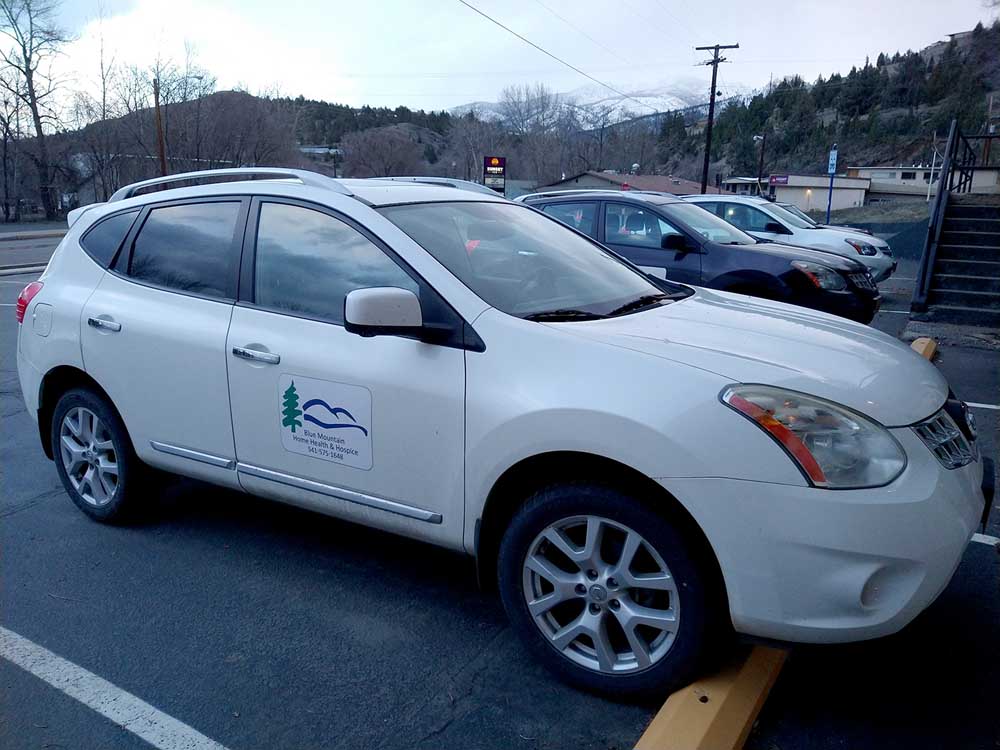Licensing foul-up means hospital won’t be paid for months of home health services
Published 7:00 am Wednesday, March 6, 2024

- Vehicles used to get caregivers to homebound patients sit in front of the Blue Mountain Home Health and Hospice buding on West Main Street in John Day.
Blue Mountain Hospital District’s transition to a new model of delivering care to homebound patients was billed as a way to save the district hundreds of thousands of dollars a year without impacting services to patients, but a botched licensing transfer has cost the district an undetermined amount of money instead.
Trending
Last summer, the John Day-based hospital district began the process of shifting its license to provide home health services from a home health agency model to a visiting nurse service model. But according to the Oregon Health Authority, the district moved too quickly, dropping its home health agency license before its visiting nurse service license was approved.
As a result, OHA says, the hospital district has not been licensed to provide home health services under either model since early September.
BMHD officials say the mixup wasn’t their fault and that they have found a way to move forward by providing home health services through a different mechanism, but the district most likely will never be reimbursed for nearly four months of patient care.
Trending
“This will hurt us financially for the short run,” district CEO Cam Marlowe said, “but we believe we have a solution for the long run.”
Home health vs. VNS
In March of 2023, BMHD formed a committee to weigh the pros and cons of switching home health care services from Blue Mountain Home Health and Hospice to the Strawberry Wilderness Community Clinic.
Both entities are owned by the hospital district but are treated differently for purposes of licensing and insurance reimbursement.
Blue Mountain Home Health and Hospice was licensed by the state as a home health agency, or HHA. As such, it could provide skilled nursing services and, using a team approach, a host of other services such as physical therapy, occupational therapy, speech pathology, medical social services, palliative care and assistance with bathing and personal hygiene.
Strawberry Wilderness Community Clinic is a federally certified rural health clinic. It can provide at-home care through a visiting nurse service program, known as VNS for short. Using the VNS model, a rural health clinic can send registered nurses or licensed practical nurses into patients’ homes to provide nursing care and personal care services, such as helping a patient bathe, exercise, get in and out of bed and take medications.
Another big difference between the two models of care is this: An HHA can’t bill insurance for time spent driving to and from patient visits, only for time spent actually delivering care, while a VNS can also bill for travel time.
A big part of the argument for switching to the VNS model was that, in a far-flung rural area like Grant County, recouping those travel costs was key to keeping home health services financially viable.
In a report presented to the district’s board of directors, Marlowe noted that the home health department had lost $380,000 in the previous fiscal year. (Marlowe now believes the loss may have been closer to $500,000.) “Transitioning to the VNS program,” he wrote in the report, “would eliminate almost all of the losses we are currently experiencing in home health.”
Community concerns
From the beginning, however, there were concerns in the community about the change. Flyers claiming that the hospital district was planning to eliminate home health and hospice services altogether were circulated, creating a hue and cry on social media.
On March 22, more than a dozen community members crowded into the back of a conference room at Blue Mountain Hospital to speak out against the proposed change at a board meeting.
During a question-and-answer session that ran for more than an hour, Marlowe explained that the only change under consideration was to the delivery model for home health care and that there were no plans to eliminate home health or hospice services. Several board members added their own assurances that no cuts to services were being contemplated.
At the following board meeting on April 26, the board voted unanimously to approve a plan to transition to a VNS model for home health services.
Now, some community members are saying they were right to be concerned.
Former Grant County Commissioner Sam Palmer, a retired nurse who worked briefly for Blue Mountain Home Health, was one of the people who spoke at the March board meeting. In a recent interview, he told the newspaper he wishes the hospital district board members had not been so quick to dismiss concerns that changing the delivery model for home health services could have a negative impact on patients, even if it did improve the district’s financial picture.
“That’s what we tried to explain that night at the board meeting,” Palmer said. “I don’t want to say they didn’t care, but they sure didn’t get it.”
Marlowe believes most of the resistance to the VNS proposal came from a small number of people who didn’t want to see any changes made to the district’s old model of service delivery, even though the shift to a new model could help keep those services financially viable.
“We had a handful of people who were very, very vocal,” he said. “Home health agencies (at other rural hospitals) are shutting down, and this to me is a 100% better solution than shutting down.”
The licensing tangle
Health care licensing is a complicated business.
In response to questions from the Blue Mountain Eagle, Oregon Health Authority officials explained that a rural health clinic can only offer visiting nurse services if there is a shortage of home health agencies in its service area. In Grant County, as long as those services were being delivered by Blue Mountain Home Health, the rural health clinic could not add a VNS program.
In other words, before Strawberry Wilderness Community Clinic could start providing home health services, Blue Mountain Home Health had to stop doing so.
The problem, according to OHA officials, is that Blue Mountain Home Health surrendered its HHA license before Strawberry Wilderness Community Clinic received its VNS license.
According to a timeline provided by OHA, the agency was notified on Aug. 11 that Blue Mountain Hospital District intended to close its home health agency on Aug. 31 and wanted to begin offering visiting nursing services through the Strawberry Wilderness Community Clinic.
But the process isn’t that simple. Offering visiting nursing services through a rural health clinic like Strawberry Wilderness requires approval from the federal Centers for Medicare and Medicaid Services, known as CMS — and, according to OHA, getting that approval can take months.
Anna L. Davis, the manager of OHA’s Health Facility Survey and Certification Program, said her office tried to make the situation clear to BMHD.
Nevertheless, Davis said, her office received notification on Aug. 24 from Blue Mountain Home Health “that they would be closing on Sept. 7, 2023, that they would return their license, and that they wished to voluntarily terminate their CMS certification.”
Davis said her office processed Blue Mountain’s HHA license cancellation on Sept. 6 and forwarded the voluntary termination recommendation to CMS. In other words, Davis said, as of Sept. 7, Blue Mountain Home Health was no longer licensed to provide home health services in Grant County.
Crossed wires
BMHD officials say they believed Blue Mountain Home Health still had an HHA license for the simple reason that they had taken back their notice of voluntary termination before it was scheduled to go into effect.
Unfortunately, they say, OHA got the voluntary termination notice but never received the message to cancel the termination.
The problem, according to BMHD, was miscommunication.
In mid-August, when the district first set out to terminate its home health agency license so it could switch over to a visiting nurse service, it sent the paperwork to National Government Services, a private contractor that processes Medicare transactions for Blue Mountain Home Health.
“This is the standard process,” said Jenna Hendriksen, director of clinics and home care services for the hospital district.
That paperwork was forwarded promptly to OHA, which confirmed that it received notice on Aug. 24 that BMHD intended to stop providing home health services through Blue Mountain Home Health and voluntarily terminate its HHA license effective Sept. 7.
At that point, BMHD officials say, they believed they would be able to switch seamlessly from the HHA model to the VNS model of delivering home health services, with no interruption in patient care. The plan was to go live with VNS on Sept. 11, the Monday after the HHA license terminated.
At the end of August or start of September, a week or more before the scheduled “go live” date, BMHD officials called National Government Services just to make sure the plan was still on track — and got a shocking response. The contractor said it could not say for sure when the district’s VNS paperwork would be processed.
At that point, Marlowe said, BMHD submitted paperwork to National Government Services rescinding its notice of voluntary termination so it could continue to see patients through Blue Mountain Home Health.
“We turned that in within a day of when we had that phone call,” Marlowe said.
But that notice apparently never got to OHA, which terminated Blue Mountain’s home health agency license as originally requested on Sept. 7.
Warning signs
BMHD, meanwhile, continued to operate on the belief that the license was still valid — even after some of the district’s insurance billings for home health started coming back unpaid.
“You would have to understand denials happen all the time in health care. … Insurance companies do not want to pay hospitals. They just don’t,” Marlowe said.
“We weren’t getting paid. That was a red flag, but it didn’t raise any red flags that this was tied to the voluntary termination and rescission.”
In December, BMHD officials filed an application to renew the district’s home health agency license with the OHA — and got another shock. According to OHA, the license couldn’t be renewed because it had been terminated in September.
“That’s when we realized, at the very end of December, ‘Oh, my gosh … they’re not showing us as being a licensed home health provider,’” Marlowe said.
Still hoping to salvage the situation, BMHD officials set up a phone call between Marlowe, Hendriksen and Erin Gosnell, the clinical director for home health and hospice, with some of the key people at OHA. During that call, Marlowe made the case that the hospital had been operating in good faith, thinking it still had a valid HHA license and continuing to provide care for patients. Could state regulators somehow find a way to make the hospital’s home health license retroactive, as though it had never lapsed?
Two weeks later, the answer came back: Sorry. We can’t do it.
In the meantime, Marlowe said, the hospital had not been idle. In late December, as soon as BMHD officials realized they no longer had a valid home health agency license and it might be awhile before they could obtain approval for a visiting nurse service, they started investigating other ways to provide services in the home.
According to Marlowe, since Jan. 1, the hospital has been providing services such as skilled nursing, wound care, physical therapy, speech therapy and occupational therapy to patients in their homes. Even though the services are being provided through the hospital’s outpatient clinic and outpatient therapy program rather than through a home health agency, Marlowe said it’s very similar in practice.
“The patient doesn’t know any different,” Marlowe said. “They’re still getting the care.”
Looking back, moving on
Looking back on the whole licensing saga, Marlowe says BMHD officials had no reason to believe they weren’t following the correct process by submitting their paperwork through National Government Services, the private contractor that processed Medicare transactions for Blue Mountain Home Health.
“I’m confident we went to the right entity,” he said. “That’s who we were told we needed to go to, and they confirmed it.”
For the hospital, it’s not yet clear what the financial fallout from the licensing debacle will be. Marlowe said OHA officials have made it plain that BMHD should not expect any insurance reimbursement for the nearly four months of services provided by Blue Mountain Home Health when it was operating without a license.
Marlowe said he does not yet know the total dollar figure all that unreimbursed care represents.
He added that BMHD has not received any payments for any of those services during the period when it had no home health license, so he doesn’t believe there should be any question of insurance fraud.
Looking to the future, Marlowe sees a silver lining: Under the new method of providing home health services through its outpatient programs, the hospital is able to bill insurance carriers for travel time — which was the whole point of trying to switch to a visiting nurse service model.
Maximizing insurance reimbursement for services, Marlowe said, is crucial to the hospital’s ability to continue providing those services for the community.
“My goal for home health is to be pretty dang close to break-even,” Marlowe said.
“As a hospital, everything’s so razor-thin now that we can’t afford to have a department that we have to subsidize with all of our other departments. And I think this past year, as painful as it was, is what we needed to go through to be on a much, much better track.”









